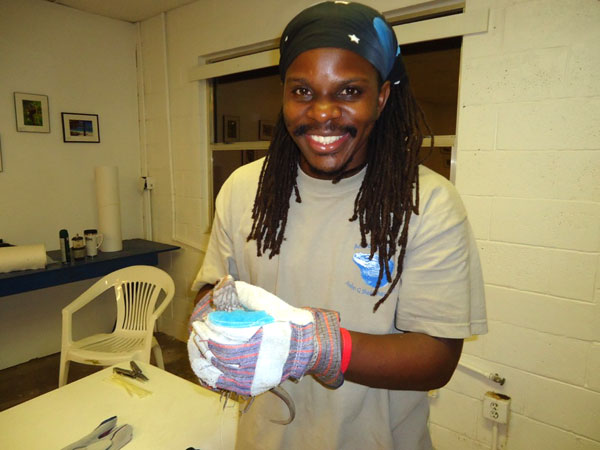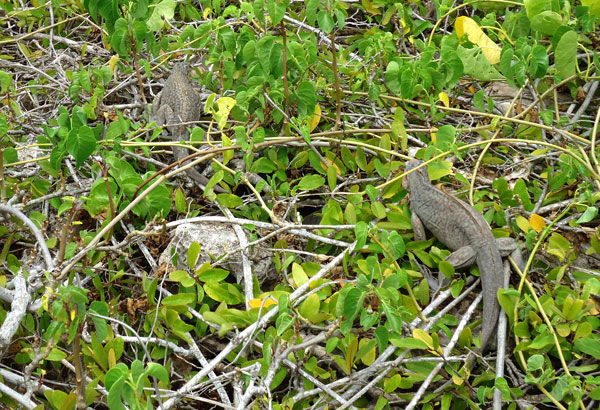
BNT Education Officer, Scott Johnson preparing one of the iguanas for its release. (BNT Photo)
|
Now that the recently poached
Bahamian rock iguanas are not only back in The Bahamas, but also back in
the wild, the Bahamas National Trust (BNT) is reminding Bahamians to be
extremely cautious when it comes to interaction with our rare Bahamian
wildlife.
“The BNT is extremely pleased that
these rescued endangered iguanas have found a home in the Moriah
Harbour Cay National Park in Exuma,” said Eric Carey, BNT Executive
Director. “It is our hope that these iguanas will be part of the
establishment of another population of this critically endangered
subspecies. The fact that they are now protected within a national park
gives them a much better chance of long-term survival.”
Carey noted that The Bahamas and
our wildlife are very vulnerable to these poaching events and it’s up to
us to be alert in our surroundings and be on guard when we encounter
persons seeking to visit or be taken to these locations where these rare
iguanas are found. Although many people are aware of poaching in our
waters, poaching our wildlife on land is also an issue and the BNT
reminds Bahamians to be vigilant.
Bahamian rock iguanas thrive in
dry areas where there are sandy patches for breeding and limestone that
provides the rock iguana with holes to retreat in. There are seven
subspecies of the rock iguana in The Bahamas: Bartsch's Rock Iguana,
Allen Cays Rock Iguana, Exuma Cays Rock Iguana, Andros Rock Iguana,
Acklin’s Rock Iguana, San Salvador Rock Iguana and White Cay Rock
Iguana. All rock iguanas in The Bahamas are protected by the Wild
Animals Protection Act, and currently, the International Union for the
Conservation of Nature (IUCN) lists all Bahamian populations of rock
iguanas as “rare”. There is also the Wildlife Conservation and Trade
Act of 2004 where the penalties for poaching the iguanas are greater.

(BNT Photo)
|
The iguanas that were recently
released in Moriah Harbour National Park were found earlier this year by
UK Border Force officers at London Heathrow Airport after being poached
from The Bahamas. Originally there were thirteen iguanas stolen, but
through the travel process, only nine of the iguanas survived. Once the
iguanas were returned to The Bahamas, they were rehabilitated at the
Gerace Research Center in San Salvador until they were well enough to
return to the wild.
“The BNT is proud of the efforts
that the Ministry of Environment with support from the Ministry of
Foreign Affairs and the UK Government to bring these animals back home
to The Bahamas where they belong,” said Carey. “We were extremely
pleased to have helped provide assistance to the government in ensuring
the iguanas return worked out well in the end.”
Once again, the BNT reminds Bahamians
throughout The Bahamas, but especially near national parks, to notify
them if they see anything suspicious. Carey reminds everyone that
“poaching can be prevented if we all do our part and speak up. If you
see suspicious activity, message the BNT on Facebook, or via our website
and if you can take photos of what’s happening, and do your part to
keep Bahamian animals in the wild in The Bahamas.”
